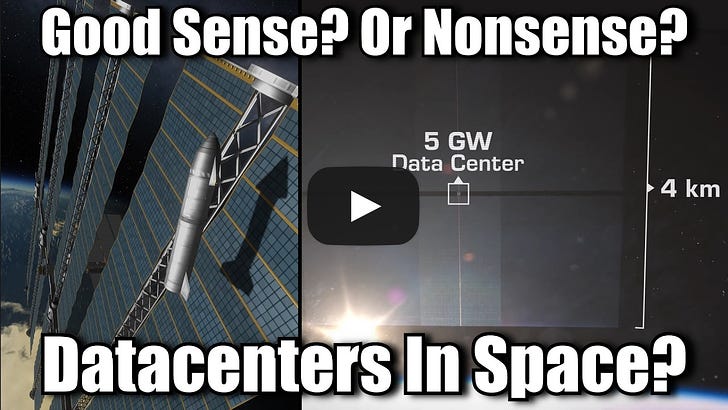OpenAI Eyes a $150 Billion Valuation - Sync #484
I hope you enjoy this free post. If you do, please like ❤️ or share it, for example by forwarding this email to a friend or colleague. Writing this post took around eight hours to write. Liking or sharing it takes less than eight seconds and makes a huge difference. Thank you! OpenAI Eyes a $150 Billion Valuation - Sync #484Plus: 60 countries endorsed a “blueprint” for military AI; Reflection 70B drama; "cyborg worms" controlled by AI; the feasibility of data centres in space; and more!Hello and welcome to Sync #484! The tech world is talking about OpenAI’s latest model, o1. I am working on an article taking a closer look at o1 and its implications for AI development, which will be out soon. However, that wasn't the only news surrounding OpenAI this week. Before o1 was released, reports surfaced that OpenAI is in talks to raise $6.5 billion and is seriously considering building its own chips with TSMC, and that is what we will take a closer look in this week’s issue of Sync. Elsewhere in AI, sixty countries have endorsed a “blueprint” for the use of AI in the military. We also explore the fable of Reflection 70B and the lessons the AI community should take from it, while Jon Y from Asianometry asks where the AI boom is heading. Over in robotics, Amazon acquired a startup focused on solving the complex problem of picking and handling a wide range of physical objects, DeepMind teaches robots to perform complex tasks requiring dexterity, and the former head of Alphabet’s AI-powered robotics moonshot shares his experience with building robots for everyday life. We will close this week’s issue with plants mining metals from the soil, day zero antivirals, and a bioengineered hangover cure. Enjoy! OpenAI Eyes a $150 Billion ValuationOpenAI just dropped their latest model, o1, and the entire tech world is talking about it, examining what it can do and what it means for future developments in artificial intelligence. However, that was not the only news surrounding OpenAI this week. The big news before o1 was released were the reports of OpenAI being in discussion for a $6.5 billion funding round, which would raise the company’s valuation to $150 billion. The list of potential investors includes Microsoft, Nvidia, and Apple. Each of these tech giants is, in one way or another, already invested in OpenAI’s success. Microsoft previously invested over $10 billion into OpenAI and is OpenAI’s largest technological and business partner. Nvidia provides the hardware needed to train and run OpenAI’s models. Jensen Huang, CEO of Nvidia, even personally delivered the first DGX H200 to OpenAI. Apple, meanwhile, is a relatively new partner. The partnership between Apple and OpenAI was the subject of many rumours surrounding Apple’s plans to introduce large language models and generative AI to their products. Eventually, Apple chose to build its own AI models for Apple Intelligence but opened the option to use third-party models for more complex queries, with ChatGPT being the first to be supported. Recent reports suggest OpenAI desperately needs a cash injection. The Information reported in July that OpenAI is on track to lose over $5 billion this year and could run out of cash by the end of the year. For comparison, Anthropic expects to burn “only” $2.7 billion in 2024. Developing AI models is an expensive business. In February 2023, SemiAnalysis reported that it costs $694,444 per day to operate ChatGPT in computer hardware costs alone. When you add operational, staffing, and R&D costs, the figures quickly escalate to millions and billions. If the funding round is successful, it would buy OpenAI more time to find a sustainable business model. OpenAI generates about $2 billion in annual revenue and expects to double that in 2025, according to the Financial Times, with most of the revenue expected to come from business customers looking to implement OpenAI’s models in their operations. In addition to talking with investors, OpenAI is also in talks with banks to secure an additional $5 billion in credit lines, reports Bloomberg. But there are some conditionsHowever, there will be reportedly some strings attached to this $6.5 billion deal. As Reuters reports, some investors request a change to OpenAI’s corporate structure and remove a profit cap for investors. OpenAI is known for its rather unusual corporate structure in which a non-profit company overseen by OpenAI board controls the capped profit company developing AI models like GPT or the new o1. This structure is a result of how OpenAI began. When OpenAI was founded in 2015, it was founded as a non-profit company. However, in 2019, in order to attract more investors, OpenAI became a capped-profit company. The company explains that this structure allows OpenAI to accept investments and be more like a traditional tech startup while at the same time being bounded by the original mission to “building safe and beneficial artificial general intelligence for the benefit of humanity.” Existing investors are bound by a capped limit on their return on investment, with any additional returns directed to the non-profit. However, OpenAI in 2024 is a very different company than it was in 2019. Over the past two years, the company has experienced massive growth, evolving from a small AI lab into a leader in AI development. It kickstarted the current AI boom with the release of ChatGPT in November 2022 and was at the centre of conversations about AI. OpenAI became the fastest company to reach 100 million users at the time and now reports having 200 million active users. Investors see how much OpenAI has grown and hope for even greater growth, especially as AGI is no longer seen as a distant fantasy but a real possibility. However, the profit cap hinders the potential for generating massive returns on their investments. It remains to be seen whether OpenAI will change its corporate structure. The non-profit, and later capped-profit, structure was established to ensure that OpenAI focuses on developing safe and beneficial AGI, rather than maximising profits for shareholders. While the removal of the profit cap would benefit investors, it would also move OpenAI further from its original mission as an open AI research lab. OpenAI’s custom AI chipsOne of the top priorities for OpenAI will be finding ways to reduce costs and avoid burning through its cash reserves. One potential solution could be designing and using its own AI chips. This is something other big companies, such as Google with their TPUs, Amazon with Graviton, and Tesla, to name a few, have already done. Using custom AI chips is something OpenAI has been exploring since last year. In fact, Sam Altman, OpenAI's CEO, was in talks in the Middle East to raise funds for the AI chip project shortly before he was ousted as CEO last year. Recent reports suggest that OpenAI is moving forward with its own AI chip project, which will be produced by TSMC using the cutting-edge 1.6 nm "A16" process node. OpenAI would join many other tech companies that have reached a point where designing and using custom-made chips tailored to their specific needs makes more sense than relying on products from Nvidia, AMD, or Intel. Going with custom AI chips presents several advantages. First is a reduced dependency on hardware manufacturers. Since the beginning of the AI boom, there has been fierce competition to acquire Nvidia’s latest AI chips, which has massively inflated the prices of GPUs. As one of the biggest players in the AI scene, OpenAI might enjoy preferential treatment from Nvidia and be among the first to receive the newest GPUs. Bringing chip design in-house also opens the possibility of building chips specifically designed to run OpenAI’s models. Unlike off-the-shelf chips like Nvidia’s H200, which need to be general enough to handle various workloads, OpenAI’s custom chips can be designed and optimised specifically for its models. This would result in gains in computing speed and power efficiency, ultimately lowering operating costs—something OpenAI would greatly benefit from. If you enjoy this post, please click the ❤️ button or share it. Do you like my work? Consider becoming a paying subscriber to support it For those who prefer to make a one-off donation, you can 'buy me a coffee' via Ko-fi. Every coffee bought is a generous support towards the work put into this newsletter. Your support, in any form, is deeply appreciated and goes a long way in keeping this newsletter alive and thriving. 🦾 More than a humanThe First Person to Receive an Eye and Face Transplant Is Recovering Well 🧠 Artificial IntelligenceFew have tried OpenAI’s Google killer. Here’s what they think. The fable of Reflection 70B ▶️ Where is the AI Boom Going? (16:30)  In this video, Jon Y from Asianometry reflects on the current state of the AI landscape, both from the hardware and software sides. He presents many interesting ideas and insights, such as the comparison between today’s OpenAI and IBM in the 1980s when the latter was introducing PCs, and discusses which AI applications are actually useful and profitable. According to Jon’s analysis, much depends on the development of the next generation of foundation models, and the next two years of scaling will be crucial for the future of AI. Sixty countries endorse 'blueprint' for AI use in military; China opts out CERN for AI is the EU’s ‘last chance’ to gain on foreign competition Canva says its AI features are worth the 300 percent price increase Scientists Make ‘Cyborg Worms’ with a Brain Guided by AI The /llms.txt file If you're enjoying the insights and perspectives shared in the Humanity Redefined newsletter, why not spread the word? 🤖 RoboticsThis Could Be the Start of Amazon’s Next Robot Revolution DeepMind: Our latest advances in robot dexterity Inside Google’s 7-Year Mission to Give AI a Robot Body 🧬 BiotechnologyHow plants could mine metals from the soil Day Zero Antivirals for Future Pandemics Silicon Valley’s new wedding perk: A bio-engineered hangover cure 💡Tangents▶️ Does It Make Sense To Put Data Centers In Space? Can They Really Cost Less To Operate? (16:36)  The computing power needed to train next-generation AI models is skyrocketing, and with it, the energy demand is also increasing. Many companies are trying to solve this problem, and one of them is Lumen Orbit, which proposes to place AI data centres in Earth’s orbit. In this video, Scott Manley dissects Lumen’s plans and highlights the engineering challenges the startup would need to solve to make their vision of training AI in space a reality, from selecting the right orbit to addressing cooling issues. Thanks for reading. If you enjoyed this post, please click the ❤️ button or share it. Humanity Redefined sheds light on the bleeding edge of technology and how advancements in AI, robotics, and biotech can usher in abundance, expand humanity's horizons, and redefine what it means to be human. A big thank you to my paid subscribers, to my Patrons: whmr, Florian, dux, Eric, Preppikoma and Andrew, and to everyone who supports my work on Ko-Fi. Thank you for the support! My DMs are open to all subscribers. Feel free to drop me a message, share feedback, or just say "hi!" |
Older messages
Humanoid robots for factories and for homes - Sync #483
Saturday, September 7, 2024
Plus: new rumours about OpenAI's new models; DeepMind AlphaProteo; DIY, pirated medicine; OpenAI and Anthropic to share models with US government; and more! ͏ ͏ ͏ ͏ ͏ ͏ ͏ ͏ ͏ ͏ ͏ ͏ ͏ ͏ ͏ ͏ ͏ ͏ ͏ ͏
Hot (AI) Chips 2024 - Sync #482
Sunday, September 1, 2024
Plus: OpenAI Strawberry could be released this autumn; AGI safety and alignment at DeepMind; OpenAI in talks for another funding round; Chinese humanoid robots; Disney's dancing robot; and more! ͏
California's controversial AI bill - Sync #481
Friday, August 23, 2024
Plus: Neuralink shares a progress update on the second clinical trial; Windows Recall is coming back in October; a $16000 humanoid robot from Unitree; a lot about drones; and more! ͏ ͏ ͏ ͏ ͏ ͏ ͏ ͏ ͏ ͏
Google goes all in with Gemini - Weekly News Roundup - Issue #480
Tuesday, August 20, 2024
Plus: Grok-2; AI and BCI helps a person with ALS speak; Nvidia delays its new AI chips; new rumours about Apple's secret robotics project; drones to carry cargo missions in the Himalayas; and more!
Figure unveils a new humanoid robot - Weekly News Roundup - Issue #479
Friday, August 9, 2024
Plus: more OpenAI drama; the race to 150; a robot playing table tennis; Groq raised $640 million; video game actors are on strike over AI concerns; and more! ͏ ͏ ͏ ͏ ͏ ͏ ͏ ͏ ͏ ͏ ͏ ͏ ͏ ͏ ͏ ͏ ͏ ͏ ͏ ͏ ͏ ͏
You Might Also Like
Daily Coding Problem: Problem #1707 [Medium]
Monday, March 3, 2025
Daily Coding Problem Good morning! Here's your coding interview problem for today. This problem was asked by Facebook. In chess, the Elo rating system is used to calculate player strengths based on
Simplification Takes Courage & Perplexity introduces Comet
Monday, March 3, 2025
Elicit raises $22M Series A, Perplexity is working on an AI-powered browser, developing taste, and more in this week's issue of Creativerly. Creativerly Simplification Takes Courage &
Mapped | Which Countries Are Perceived as the Most Corrupt? 🌎
Monday, March 3, 2025
In this map, we visualize the Corruption Perceptions Index Score for countries around the world. View Online | Subscribe | Download Our App Presented by: Stay current on the latest money news that
The new tablet to beat
Monday, March 3, 2025
5 top MWC products; iPhone 16e hands-on📱; Solar-powered laptop -- ZDNET ZDNET Tech Today - US March 3, 2025 TCL Nxtpaper 11 tablet at CES The tablet that replaced my Kindle and iPad is finally getting
Import AI 402: Why NVIDIA beats AMD: vending machines vs superintelligence; harder BIG-Bench
Monday, March 3, 2025
What will machines name their first discoveries? ͏ ͏ ͏ ͏ ͏ ͏ ͏ ͏ ͏ ͏ ͏ ͏ ͏ ͏ ͏ ͏ ͏ ͏ ͏ ͏ ͏ ͏ ͏ ͏ ͏ ͏ ͏ ͏ ͏ ͏ ͏ ͏ ͏ ͏ ͏ ͏ ͏ ͏ ͏ ͏ ͏ ͏ ͏ ͏ ͏ ͏ ͏ ͏ ͏ ͏ ͏ ͏ ͏ ͏ ͏ ͏ ͏ ͏ ͏ ͏ ͏ ͏ ͏ ͏ ͏ ͏ ͏ ͏ ͏ ͏ ͏ ͏ ͏ ͏ ͏ ͏
GCP Newsletter #440
Monday, March 3, 2025
Welcome to issue #440 March 3rd, 2025 News LLM Official Blog Vertex AI Evaluate gen AI models with Vertex AI evaluation service and LLM comparator - Vertex AI evaluation service and LLM Comparator are
Apple Should Swap Out Siri with ChatGPT
Monday, March 3, 2025
Not forever, but for now. Until a new, better Siri is actually ready to roll — which may be *years* away... Apple Should Swap Out Siri with ChatGPT Not forever, but for now. Until a new, better Siri is
⚡ THN Weekly Recap: Alerts on Zero-Day Exploits, AI Breaches, and Crypto Heists
Monday, March 3, 2025
Get exclusive insights on cyber attacks—including expert analysis on zero-day exploits, AI breaches, and crypto hacks—in our free newsletter. ͏ ͏ ͏ ͏ ͏ ͏ ͏ ͏ ͏ ͏ ͏ ͏ ͏ ͏ ͏
⚙️ AI price war
Monday, March 3, 2025
Plus: The reality of LLM 'research'
Post from Syncfusion Blogs on 03/03/2025
Monday, March 3, 2025
New blogs from Syncfusion ® AI-Driven Natural Language Filtering in WPF DataGrid for Smarter Data Processing By Susmitha Sundar This blog explains how to add AI-driven natural language filtering in the



